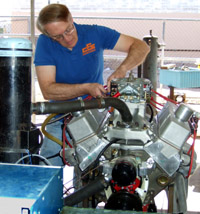|
About Us
|
 |
 |
 |
 |
 |
C.F.S. Philosophy on Dyno Testing
Dyno testing is, in my opinion, all about making more torque and horsepower. In addition to misusing a dyno's data acquisition system to enhance the power numbers, there are other things that can be done in dyno testing that can hinder your ability to find real power gains, and get those gains to show up in the racing vehicle where that engine will be used. Our basic approach s to simulate every aspect of the setup on the dyno as close to the setup of the racing vehicle as is possible. This includes the fuel pump, fuel pressure regulator, ignition system, and the entire exhaust system.

The same thing applies to the exhaust system. Most operators, for convenience, will use the same set of "dyno headers" on every small block Chevrolet that goes on the dyno, no matter whether those headers are similar to what the vehicle has or not. At C.F.S., we go to great lengths to use the exact headers from the vehicle, because then we know that the power we have when we finish testing will get to the racing vehicle.
Many times we have seen racers struggling at the track because their engine was dyno tested with headers, fuel pump, regulator, and /or ignition system different from what they race with. Our dyno room has a roll-up door so that we can test with entire exhaust system from the vehicle, including mufflers and tailpipes. Our fuel flow measuring system can be configured to use any type of fuel pump used on carbureted or fuel injected racing engines. We can incorporate any ignition system component commonly used in racing. Again, the extra effort put into this simulation pays off in the way the engine performs at the track. After all, that is the main reason for going to the dyno. Norm Schenck